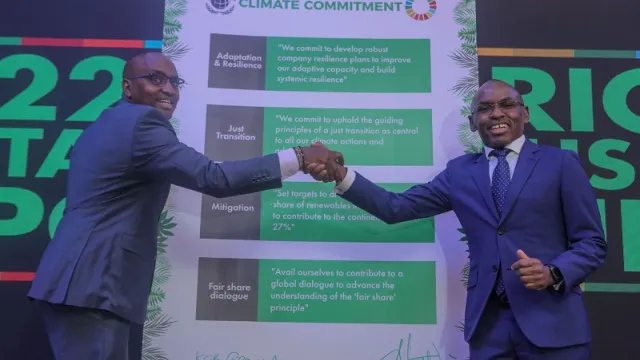Safaricom urges CEOs in Kenya to back UN's climate action, sustainable growth agendas

Safaricom urges CEOs in Kenya to back UN's climate action, sustainable growth agendas
Safaricom’s CEO Peter Ndegwa is calling on other captains of industry across Kenya to join the telco on Africa Business Leaders Coalition (ABLC) to advance climate action and sustainable growth agendas.
The telco is one of the founding members of the coalition whose aim is to bring together CEOs from across the continent to help drive action on pressing sustainability issues and promote UN Global Compact principles in their supply chains and the broader ecosystem.
Speaking during Safaricom’s 11th Sustainability Report launch, Mr Ndegwa urged CEOs to take initiative and be part of the commitment to advance Africa's sustainable growth, prosperity and development.
“Together with my fellow CEOs, we are advancing the agenda on the importance of partnerships in resolving pressing global challenges such as climate change. We would like to use this forum to rally the collective action of businesses in coming up with sustainable solutions towards shared prosperity,” Mr Ndegwa said.
We take our commitment to SDG7: Affordable and Clean Energy very seriously and are committed to becoming a net zero emitting company by 2050. We are achieving this in several ways which include solarising sites, modernising power systems and moving away from fossil power. Against the backdrop of rapidly rising energy costs, this makes sense from a financial, as well as an environmental perspective, the CEO noted.
Safaricom’s latest Sustainability report titled Partnering for Growth: Transforming Lives, covers the company’s last 12 months ended 31st March 2022 and highlights the progress it has made towards building a more sustainable business.
Key among these is the ‘True Earnings’ bridge which indicates that the total value Safaricom created for Kenyan society was Kes727 billion, which is roughly 10 times greater than its financial profit. This represents a nine percent increase compared to 2021.
Read also: KCB cuts carbon footprint, screens Kes336 billion in green loans
“We are now at a point where even critics have given up denying the reality about climate change. Storms, droughts, and rising sea levels are bleak signs of what we are facing. Today, several parts of world have become uninhabitable because of climate change. That’s why we must all act by individually and collectively pushing for a greener economy,” said KCB Group CEO Paul Russo while signing the climate action commitment.
At the moment, the regional lender is enhancing its loan portfolio with a view to aligning with sustainable development and have 25 percent of their loan portfolio dedicated to green projects, up from the current 8.4 percent.
In the period ended March, mobile cash transfer service M-PESA’s social value increased by 14 percent to Kes275 billion driven by uptick in the number of customers, agents, merchants and average number and value of transactions per customer.
Founded in 2000, Safaricom has grown to establish 6,046 network sites, 10,880 kilometres in fibre optic footprint as of March this year.
“Safaricom demonstrated resilience in living true to our commitment of being a sustainable purpose-driven business which has delivered consistent returns to shareholders.
"Our business continues to contribute towards successfully improving the quality of life for Kenyans across the country by delivering a wide range of products, services and initiatives that support businesses, and communities,” added Mr Ndegwa.
Since 2015, Safaricom has used the True Value methodology to quantify its positive and negative impact to society, the environment, and the economy in monetary terms.
The True Value assessment calculates that Safaricom sustained over 214,000 direct and indirect jobs during the year and, if the wider effects on the economy are included, this number increases to over 1.1 million jobs.
At the moment, Safaricom serves 42.4 million customers and runs a network of 262,000 service agents across the country, the report says.



